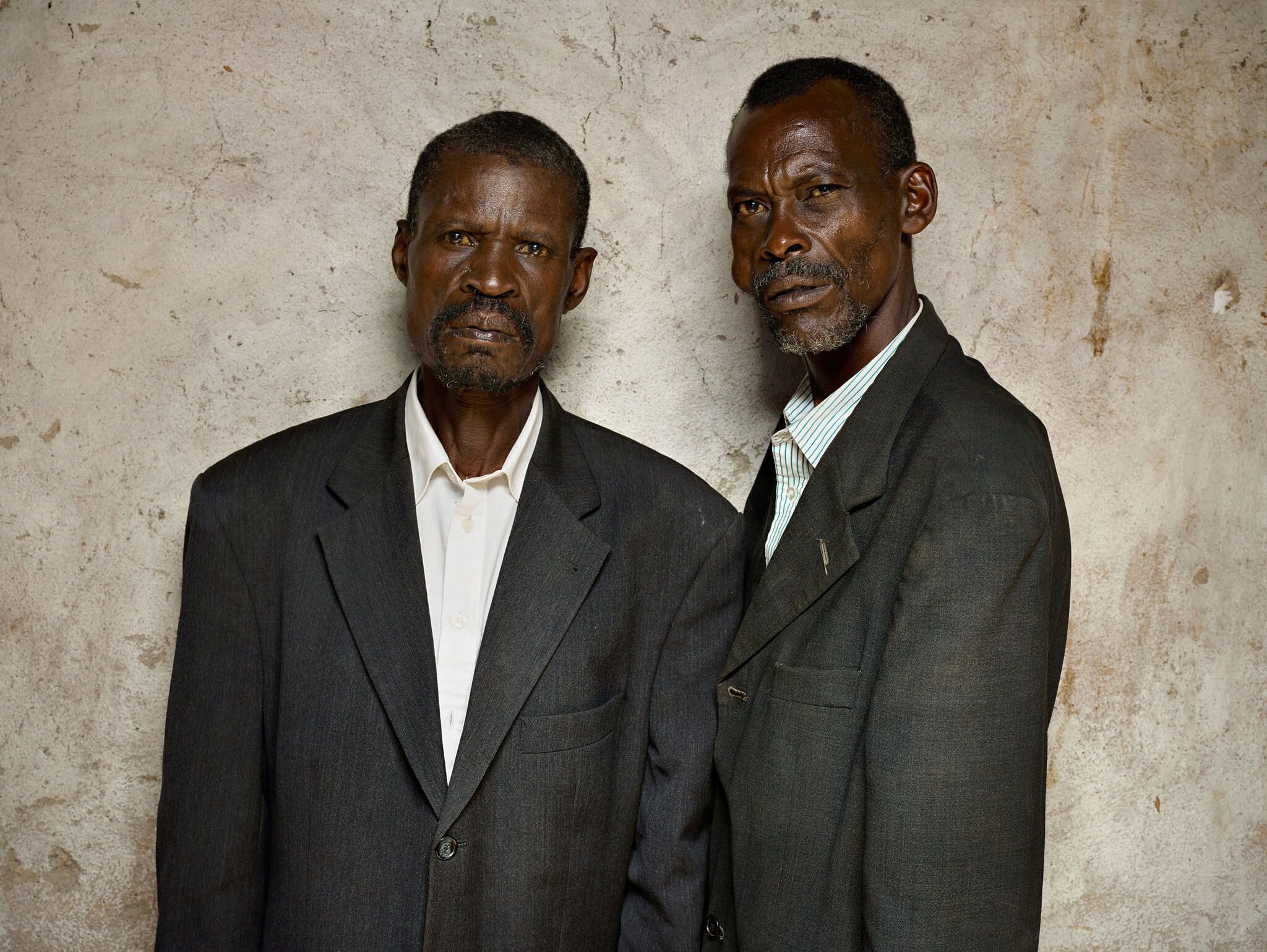Last month, the photographer Pieter Hugo went to southern Rwanda, two decades after nearly a million people were killed during the country’s genocide, and captured a series of unlikely, almost unthinkable tableaus. In one, a woman rests her hand on the shoulder of the man who killed her father and brothers. In another, a woman poses with a casually reclining man who looted her property and whose father helped murder her husband and children. In many of these photos, there is little evident warmth between the pairs, and yet there they are, together. In each, the perpetrator is a Hutu who was granted pardon by the Tutsi survivor of his crime.
The people who agreed to be photographed are part of a continuing national effort toward reconciliation and worked closely with AMI (Association Modeste et Innocent), a nonprofit organization. In AMI’s program, small groups of Hutus and Tutsis are counseled over many months, culminating in the perpetrator’s formal request for forgiveness. If forgiveness is granted by the survivor, the perpetrator and his family and friends typically bring a basket of offerings, usually food and sorghum or banana beer. The accord is sealed with song and dance.
The photographs on the following pages are a small selection of a larger body on display — outdoors, in large format — starting this month in The Hague. The series was commissioned by Creative Court, an arts organization based there, as part of “Rwanda 20 Years,” a program exploring the theme of forgiveness. The images will eventually be shown at memorials and churches in Rwanda.
At the photo shoots, Hugo said, the relationships between the victims and the perpetrators varied widely. Some pairs showed up and sat easily together, chatting about village gossip. Others arrived willing to be photographed but unable to go much further. “There’s clearly different degrees of forgiveness,” Hugo said. “In the photographs, the distance or closeness you see is pretty accurate.”
In interviews conducted by AMI and Creative Court for the project, the subjects spoke of the pardoning process as an important step toward improving their lives. “These people can’t go anywhere else — they have to make peace,” Hugo explained. “Forgiveness is not born out of some airy-fairy sense of benevolence. It’s more out of a survival instinct.” Yet the practical necessity of reconciliation does not detract from the emotional strength required of these Rwandans to forge it — or to be photographed, for that matter, side by side.
Sinzikiramuka, Perpetrator (opening image, left): “I asked him for forgiveness because his brother was killed in my presence. He asked me why I pleaded guilty, and I replied that I did it as someone who witnessed this crime but who was unable to save anybody. It was the order from authorities. I let him know who the killers were, and the killers also asked him for pardon.”
Karorero, Survivor: “Sometimes justice does not give someone a satisfactory answer — cases are subject to corruption. But when it comes to forgiveness willingly granted, one is satisfied once and for all. When someone is full of anger, he can lose his mind. But when I granted forgiveness, I felt my mind at rest.”
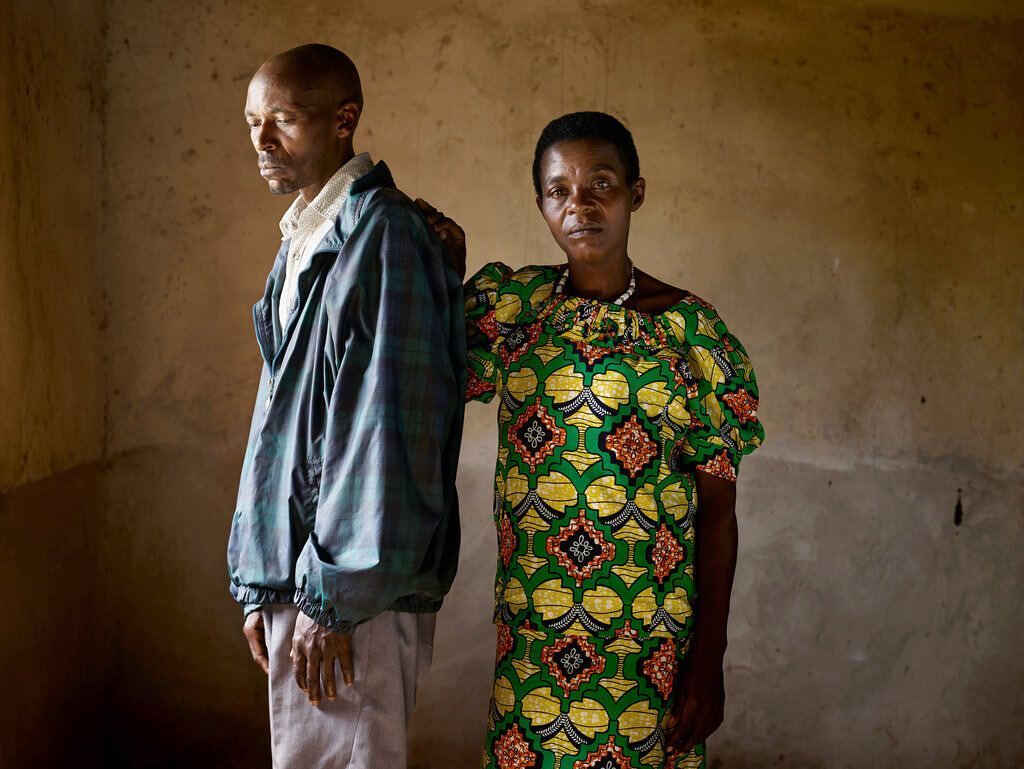
Jean Pierre Karenzi Perpetrator (left)
Viviane Nyiramana Survivor
Karenzi: “My conscience was not quiet, and when I would see her I was very ashamed. After being trained about unity and reconciliation, I went to her house and asked for forgiveness. Then I shook her hand. So far, we are on good terms.”
Nyiramana: “He killed my father and three brothers. He did these killings with other people, but he came alone to me and asked for pardon. He and a group of other offenders who had been in prison helped me build a house with a covered roof. I was afraid of him — now I have granted him pardon, things have become normal, and in my mind I feel clear.”
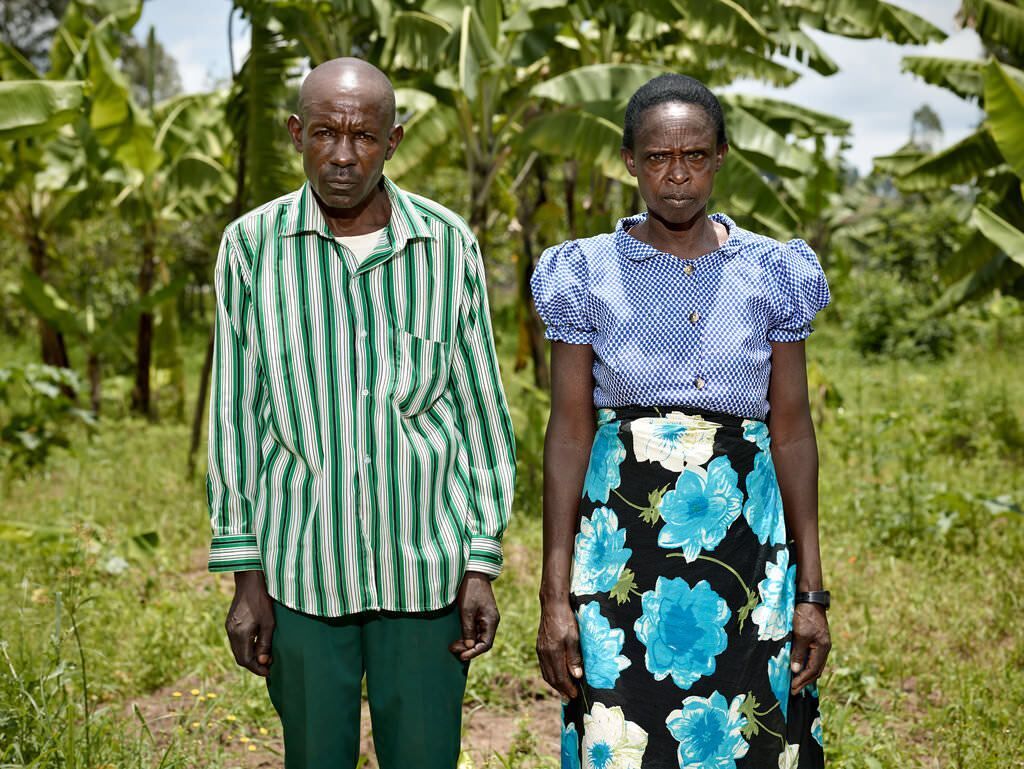
Godefroid Mudaheranwa Perpetrator (left)
Evasta Mukanyandwi Survivor
Mudaheranwa: “I burned her house. I attacked her in order to kill her and her children, but God protected them, and they escaped. When I was released from jail, if I saw her, I would run and hide. Then AMI started to provide us with trainings. I decided to ask her for forgiveness. To have good relationships with the person to whom you did evil deeds — we thank God.”
Mukanyandwi: “I used to hate him. When he came to my house and knelt down before me and asked for forgiveness, I was moved by his sincerity. Now, if I cry for help, he comes to rescue me. When I face any issue, I call him.”
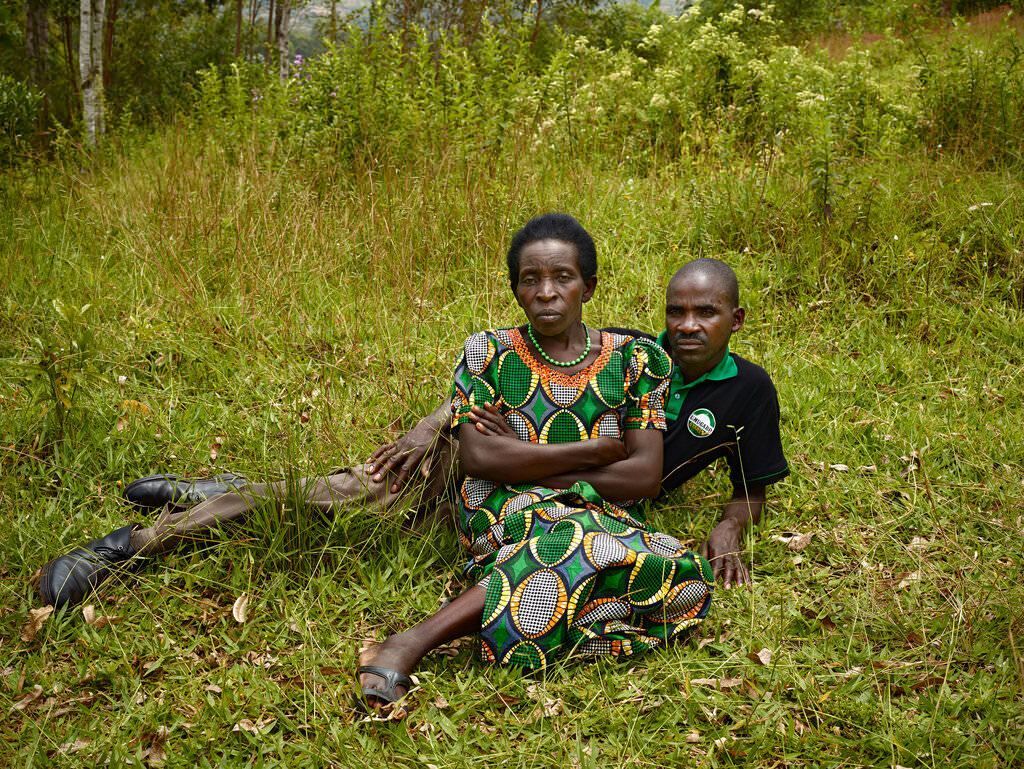
Juvenal Nzabamwita Perpetrator (right)
Cansilde Kampundu Survivor
Nzabamwita: “I damaged and looted her property. I spent nine and a half years in jail. I had been educated to know good from evil before being released. And when I came home, I thought it would be good to approach the person to whom I did evil deeds and ask for her forgiveness. I told her that I would stand by her, with all the means at my disposal. My own father was involved in killing her children. When I learned that my parent had behaved wickedly, for that I profoundly begged her pardon, too.”
Kampundu: “My husband was hiding, and men hunted him down and killed him on a Tuesday. The following Tuesday, they came back and killed my two sons. I was hoping that my daughters would be saved, but then they took them to my husband’s village and killed them and threw them in the latrine. I was not able to remove them from that hole. I knelt down and prayed for them, along with my younger brother, and covered the latrine with dirt. The reason I granted pardon is because I realized that I would never get back the beloved ones I had lost. I could not live a lonely life — I wondered, if I was ill, who was going to stay by my bedside, and if I was in trouble and cried for help, who was going to rescue me? I preferred to grant pardon.”
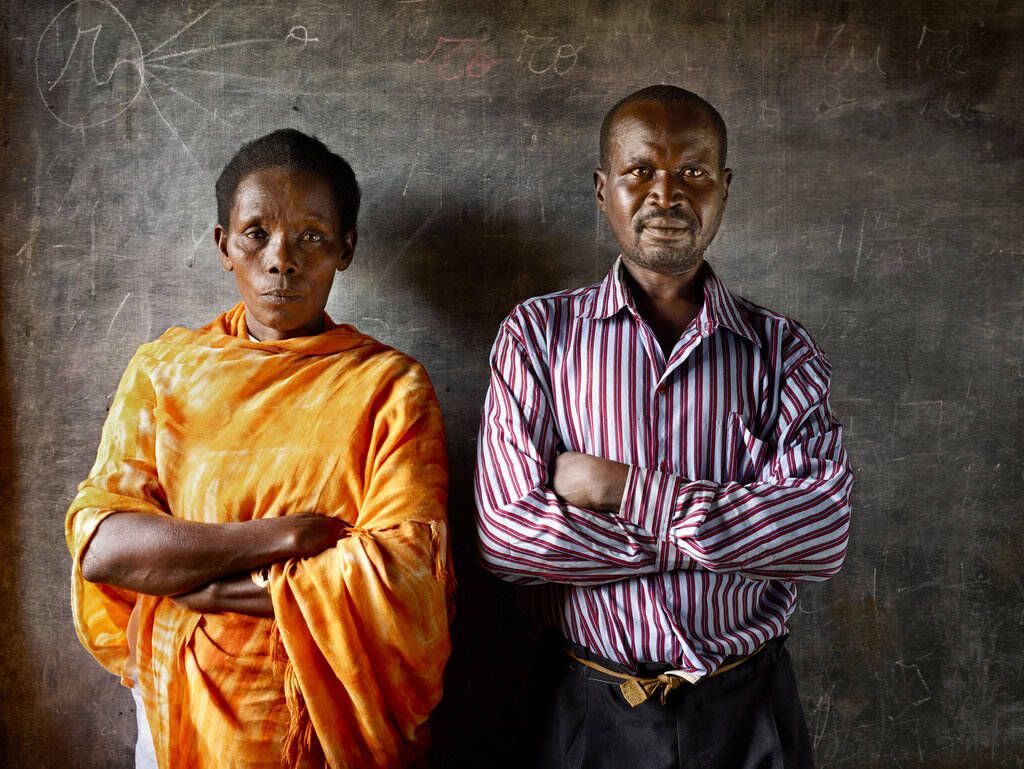
Deogratias Habyarimana Perpetrator (right)
Cesarie Mukabutera Survivor
Habyarimana: “When I was still in jail, President Kagame stated that the prisoners who would plead guilty and ask pardon would be released. I was among the first ones to do this. Once I was outside, it was also necessary to ask pardon to the victim. Mother Mukabutera Caesarea could not have known I was involved in the killings of her children, but I told her what happened. When she granted me pardon, all the things in my heart that had made her look at me like a wicked man faded away.”
Mukabutera: “Many among us had experienced the evils of war many times, and I was asking myself what I was created for. The internal voice used to tell me, ‘‘It is not fair to avenge your beloved one.’’ It took time, but in the end we realized that we are all Rwandans. The genocide was due to bad governance that set neighbors, brothers and sisters against one another. Now you accept and you forgive. The person you have forgiven becomes a good neighbor. One feels peaceful and thinks well of the future.”
Ntambara: “Because of the genocide perpetrated in 1994, I participated in the killing of the son of this woman. We are now members of the same group of unity and reconciliation. We share in everything; if she needs some water to drink, I fetch some for her. There is no suspicion between us, whether under sunlight or during the night. I used to have nightmares recalling the sad events I have been through, but now I can sleep peacefully. And when we are together, we are like brother and sister, no suspicion between us.”
Mukamusoni: “He killed my child, then he came to ask me pardon. I immediately granted it to him because he did not do it by himself — he was haunted by the devil. I was pleased by the way he testified to the crime instead of keeping it in hiding, because it hurts if someone keeps hiding a crime he committed against you. Before, when I had not yet granted him pardon, he could not come close to me. I treated him like my enemy. But now, I would rather treat him like my own child.”
Ndahimana: “The day I thought of asking pardon, I felt unburdened and relieved. I had lost my humanity because of the crime I committed, but now I am like any human being.”
Munganyinka: “After I was chased from my village and Dominique and others looted it, I became homeless and insane. Later, when he asked my pardon, I said: ‘I have nothing to feed my children. Are you going to help raise my children? Are you going to build a house for them?’ The next week, Dominique came with some survivors and former prisoners who perpetrated genocide. There were more than 50 of them, and they built my family a house. Ever since then, I have started to feel better. I was like a dry stick; now I feel peaceful in my heart, and I share this peace with my neighbors.”
Nsabimana: “I participated in destroying her house because we took the owner for dead. The houses that remained without owners — we thought it was better to destroy them in order to get firewood. Her forgiveness proved to me that she is a person with a pure heart.”
Mukarwambari: “If I am not stubborn, life moves forward. When someone comes close to you without hatred, although horrible things happened, you welcome him and grant what he is looking for from you. Forgiveness equals mercy.”
See article from source:

